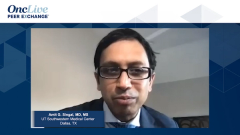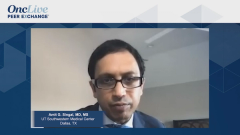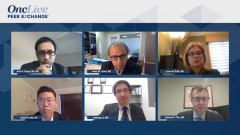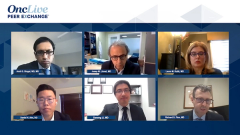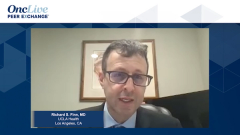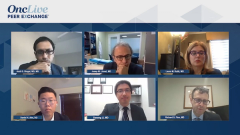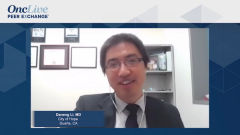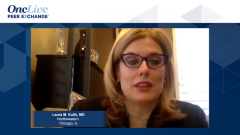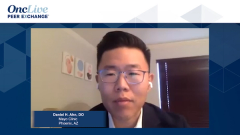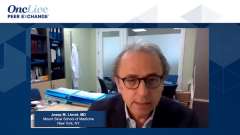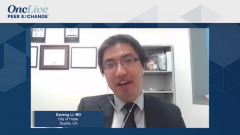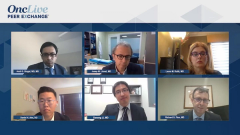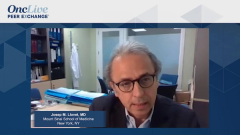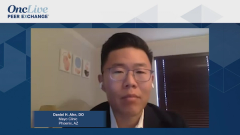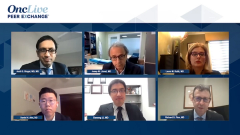
HCC Treatment: Emerging Data in IO Combinations
Experts discuss emerging data in immunotherapy combination approaches for the treatment of advanced HCC.
Episodes in this series

Richard S. Finn, MD: That bring us to I/O [immuno-oncology] combinations that are in phase 3. Certainly when we say that, we are referring to PD-1 inhibition or PD-L1 inhibition in combination with CTLA4 inhibition. Daniel, at the Mayo Clinic, you’ve been involved with the HIMALAYA study, which looks at the PD-L1 antibody durvalumab in combination with the CTLA4 inhibitor, and there were some data at ASCO [American Society of Clinical Oncology Annual Meeting] last year that generated a lot of hope for this combination. Can you build on that?
Daniel H. Ahn, DO: Yes. We all have come to a consensus that targeting VEGF and I/O is not only a promising strategy but an established strategy in the first-line setting. The readout of both HIMALAYA, which looked at combination durvalumab plus tremelimumab, and CheckMate 9DW, which looked at the same MOA [mechanism of action], will provide another alternative treatment option if deemed positive in the first-line setting for patients who would not potentially be candidates for antiangiogenic agents, whether it’s because of high risk for esophageal variceal bleeding or other contraindications. These 2 studies are very interesting because they looked at an alternative strategy if deemed positive, in addition to all the other phase 3 studies that are panning out.
As Rich mentioned, the data do look very promising, especially from the hint of activity that we’ve seen from CheckMate040 and some of the early data from the durvalumab-tremelimumab combination. Ultimately, I hope that both phase 3 studies end up being positive, so they provide us with alternative treatment strategies for patients who would not be candidates for atezolizumab-bevacizumab or some of these other interesting treatment options.
Richard S. Finn, MD: Yes, we want to see more positive data, and when we had lenvatinib approved in the front line, it was: How do you choose between sorafenib and lenvatinib? It is quite possible that we have a number of combinations in the future that might be positive, and we might be discussing how we choose between combinations—I/O plus I/O or I/O plus TKI [tyrosine kinase inhibitor]—and even which specific agents within those groups.
Dan, nivolumab-ipilimumab has accelerated approval in the United States in the second-line setting. It is being looked at in the frontline setting. What’s your sense of those data from the second line, and how might that impact a phase 3 study?
Daneng Li, MD: The combination nivolumab-ipilimumab is very interesting. As mentioned previously, in CheckMate040 the response rate was 31% in that single-arm study, at least with the higher dose of ipilimumab, and an overall survival of over 20 months. That’s very consistent, as you mentioned before, with what we saw earlier with lenvatinib-pembrolizumab and atezolizumab-bevacizumab in the earlier phase 1b studies. Hopefully that will also translate in the phase 3 studies.
What’s interesting about all these phase 3 studies is that they do have slightly different control arms. We have to look at that in the sense that HIMALAYA is going against a control arm of sorafenib, and so is COSMIC-312. But LEAP-002 is going against lenvatinib, and we know that with a coprimary end point of progression-free survival, that’s potentially a slightly higher bar. Also, with CheckMate 9DW, it’s going against investigator choice of either sorafenib or lenvatinib, so potentially also a little higher bar for that progression-free survival end point. That’s something to keep in mind as these studies come through.
Richard S. Finn, MD: Yes. The data are the data, and we look forward to seeing them. Then we’ll have to parse things out. Obviously, adverse effects come into play.
Laura, the I/O–I/O combinations, at least from what we’ve seen with nivolumab-ipilimumab, have a higher incidence of immune-related adverse events compared with single-agent I/O. As a hepatologist, do autoimmune events make you nervous, or are they not a big deal?
Laura M. Kulik, MD: They do, but autoimmune events are manageable. If you see them, you have to decide what you’re going to do. You’re going to stop treatment; you’re going to use prednisone, and you’re going to go up and use mycophenolate. Fortunately, in the liver patients, we haven’t seen a signal that they’re more at risk for an autoimmune phenomenon despite the fact that they have underlying liver disease compared with other cancers that are being used with these combinations as well.
You do have to watch these patients a little closer, because if they do have a severe reaction and it’s not caught in time, they’re going to be at more risk of decompensation that would lead to having to stop all their cancer-related therapies.
Richard S. Finn, MD: That’s an important thing to keep in mind because all our patients have chronic liver disease. They need to be watched closely.
Transcript Edited for Clarity


